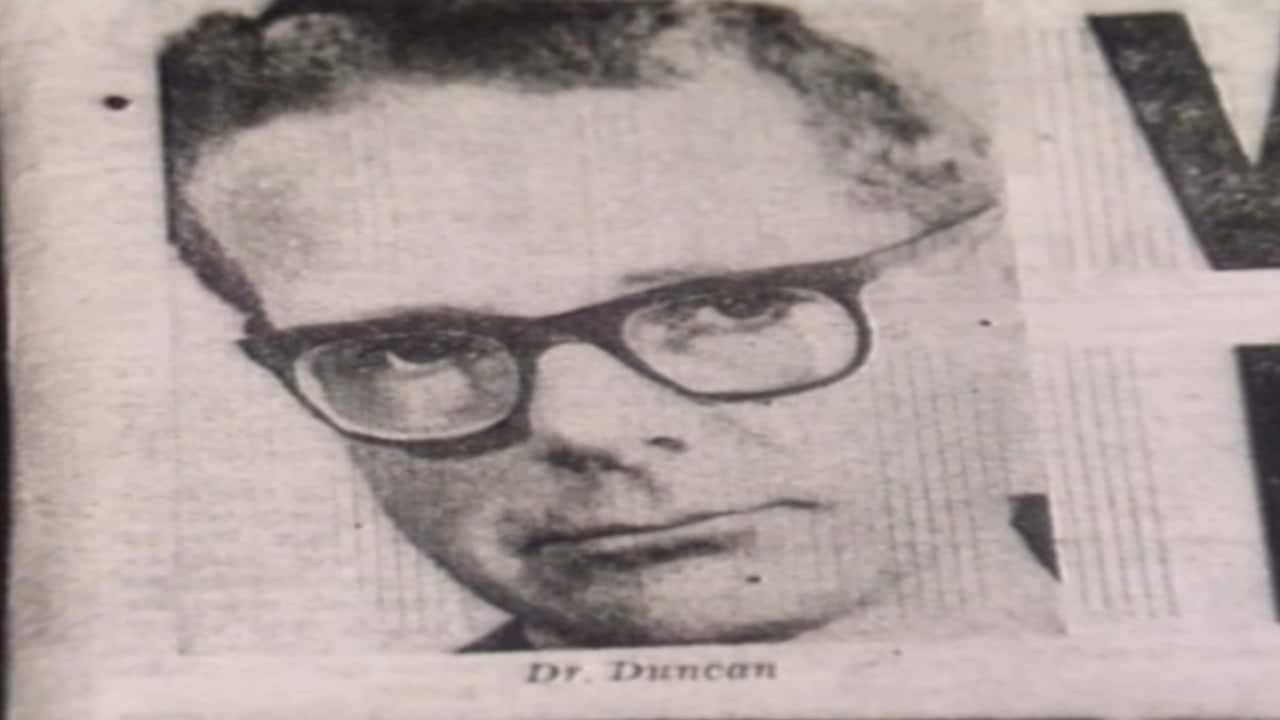This story discusses violence against LGBTIQ+ people.
Nobody has ever been convicted of killing lawyer George Iain Duncan.
Duncan drowned after being thrown from a footbridge into Adelaide’s River Torrens by a group of men on 10 May 1972.
He had only been living in Adelaide for six weeks and didn’t know how to swim.
The area was a well-known gay beat — a place where men gathered to meet and have sex.
Duncan’s death led directly to major legal reform in Australia and around the world.
Three police officers were charged in relation to Duncan’s death but acquitted. Credit: Adelaide Advertiser
Three years later, South Australia became the first English-speaking state in the world to decriminalise homosexuality.
The relatively unknown story of tragedy and triumph is told in an upcoming Opera Australia performance.
It comes days after to those convicted under former laws that criminalised homosexuality.
Alleged police involvement in George Duncan’s case
Neil Armfield is directing Watershed, which tells the story of Duncan’s death and how the outrage and momentum following it changed Australia.
“There has always been this persistent rumour and whistle-blowing … that it was a job by off-duty vice-squad officers,” Armfield said.
“We’re told that they had a practice called ‘teaching the poofters to swim.'”
A Coroner’s inquest a month after Duncan’s death found it had been caused by violence inflicted by unknown persons.
Two members of the police vice squad refused to answer questions and they and another officer were suspended from the force and later resigned.
Three officers were tried and acquitted for Duncan’s death.
Decriminalising homosexuality in South Australia
Writer Paul Paech was a student in Adelaide at the time of Duncan’s death.
“I was down at the beat some days later and there was a lot of discussion amongst the gay men there as to what had gone on. And I realised that was a flashpoint,” he told SBS News.
“Adelaide citizens were horrified, they were outraged that a person of that stature should have met such a sticky end in their city.
“They wanted to be a hospitable, cultured, sophisticated city, and here a highly reputable person had been drowned, possibly at the hands of police.”
Paul Paech said George Duncan’s death led to positive change. Source: SBS News
Paech, along with friends and Duncan’s University of Adelaide started a protest movement that snowballed.
The public outcry was too loud for the premier at the time, Don Dunstan, to ignore.
“We had no idea what would happen, and I don’t think anybody ever knows what will happen as a result of what you do. We were very fortunate to be part of history at that time,” Paech said.
“Good came from that death — we used his death to create a social space where people could live more of their lives.”
George Duncan’s legacy
Armfield said Duncan’s death led to great outrage and people asking: “What kind of a society do we want to live in?”
Neil himself was attacked at a beat in Sydney’s Moore Park in the 1980s.
“Out in a stand of paperbarks I was grabbed from behind and swung around and was bashed straight in the face and my nose was broken and there was a flood of blood.
“It was a group of four or five young men and they were yelling ‘AIDS, poofter’ at me.”
He said the people working on Watershed understood and connected with the story being told.
Neil Armfield is directing Watershed — an opera telling the story of George Duncan’s death. Source: SBS News
“It seemed particularly appropriate to this that [librettists] Christos Tsiolkas and Alana Valentine, and Joeseph Twist the composer, being gay people would have a sense of identification that was particularly heartfelt.”
Watershed is told in the musical form of oratorio usually reserved for sacred texts — a reverence that one of the lead performers says strikes a chord.
“To fail to recognise and understand history is to repeat history and we can’t afford for that to happen”, Mark Oates said.
As Watershed takes the stage at the Sydney Opera House this month, the legacy of a quiet man with a loud impact lives on.
LGBTIQ+ Australians seeking support with mental health can contact QLife on 1800 184 527 or visit . also has a list of support services.



